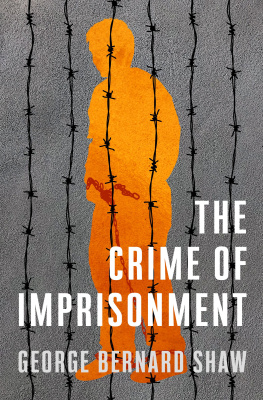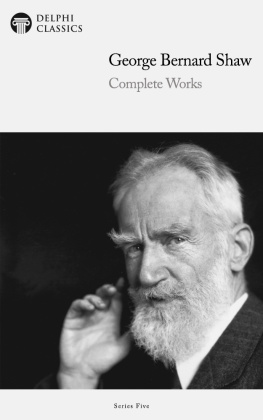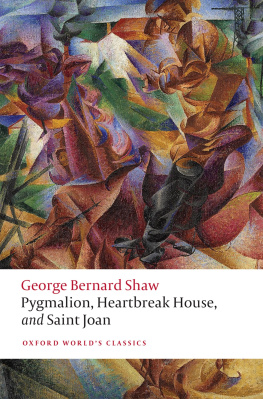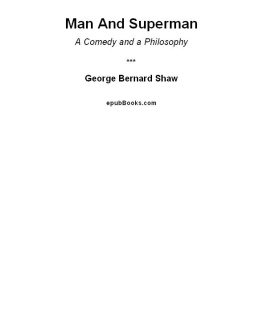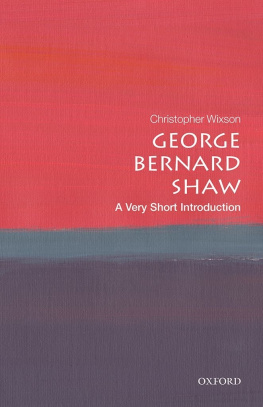H.L. Mencken - George Bernard Shaw: His Plays
Here you can read online H.L. Mencken - George Bernard Shaw: His Plays full text of the book (entire story) in english for free. Download pdf and epub, get meaning, cover and reviews about this ebook. year: 2011, publisher: Barnes & Noble, genre: Humor. Description of the work, (preface) as well as reviews are available. Best literature library LitArk.com created for fans of good reading and offers a wide selection of genres:
Romance novel
Science fiction
Adventure
Detective
Science
History
Home and family
Prose
Art
Politics
Computer
Non-fiction
Religion
Business
Children
Humor
Choose a favorite category and find really read worthwhile books. Enjoy immersion in the world of imagination, feel the emotions of the characters or learn something new for yourself, make an fascinating discovery.
- Book:George Bernard Shaw: His Plays
- Author:
- Publisher:Barnes & Noble
- Genre:
- Year:2011
- Rating:4 / 5
- Favourites:Add to favourites
- Your mark:
- 80
- 1
- 2
- 3
- 4
- 5
George Bernard Shaw: His Plays: summary, description and annotation
We offer to read an annotation, description, summary or preface (depends on what the author of the book "George Bernard Shaw: His Plays" wrote himself). If you haven't found the necessary information about the book — write in the comments, we will try to find it.
In this 1905 short work of criticism, one great satirical mind pays tribute to another. In addition to lively synopses and appreciations of Mrs. Warrens Profession, Arms and the Man, The Devils Disciple, Man and Superman, Caesar and Cleopatra, and others, Mencken offers an epilogue on Shaw and Shakespeare.
George Bernard Shaw: His Plays — read online for free the complete book (whole text) full work
Below is the text of the book, divided by pages. System saving the place of the last page read, allows you to conveniently read the book "George Bernard Shaw: His Plays" online for free, without having to search again every time where you left off. Put a bookmark, and you can go to the page where you finished reading at any time.
Font size:
Interval:
Bookmark:
HIS PLAYS
H. L. MENCKEN

This 2011 edition published by Barnes & Noble, Inc.
All rights reserved. No part of this publication may be reproduced, stored in a retrieval system, or transmitted, in any form or by any means, electronic, mechanical, photocopying, recording, or otherwise, without prior written permission from the publisher.
Barnes & Noble, Inc.
122 Fifth Avenue
New York, NY 10011
ISBN: 978-1-4114-4016-6
PREFACE
T HIS is a little handbook for the reading tables of Americans interested enough in the drama of the day to have some curiosity regarding the plays of George Bernard Shaw, but too busy to give them careful personal study or to read the vast mass of reviews, magazine articles, letters to the editor, newspaper paragraphs and reports of debates that deal with them. Every habitual writer now before the public, from William Archer and James Huneker to "Vox Populi" and "An Old Subscriber" has had his say about Shaw. In the pages following there is no attempt to formulate a new theory of his purposes or a novel interpretation of his philosophies. Instead, the object of this modest book is to bring all of the Shaw commentators together upon the common ground of admitted fact, to exhibit the Shaw plays as dramas rather than as transcendental treatises, and to describe their plots, characters, and general plans simply and calmly, and without reading into them anything invisible to the naked eye.
The order in which the plays are considered is not the chronological one, and some readers may think that it is not the logical one. Inasmuch as an exposition of the reasons that urged its adoption would waste a great deal of space, the point will not be argued. The brief biography of the dramatist is based upon the most accurate available eulogies, denunciations, reminiscences, and manuscripts. So, too, the historical data regarding the plays and other publications.
The reputation of Mr. Shaw as a playwright has so far exceeded his renown as a novelist, a socialist, a cart-tail orator, a journeyman reformer, a vegetarian, and a critic of literature and the arts, that his novels and other minor works have been noticed but briefly. But this is not to be taken as evidence that they do not merit acquaintance. Even the worst of Shaw is well worth study.
BY WAY OF INTRODUCTION
What else is talent but a name for experience, practice, appropriation, incorporation, from the times of our forefathers?
FRIEDRICH NIETZSCHE.
A CENTURY is a mere clock-tick in eternity, but measured by human events it is a hundred long years. Napoleon Bonaparte, born in 1768, became an officer of artillery and gravedigger for an epoch. Born in 1868, he might have become a journeyman genius of the boulevards, a Franco-Yankee trust magnate, or the democratic boss of Kansas City. And so, contrariwise, George Bernard Shaw, born in 1756 instead of 1856, might have become a gold-stick-in-waiting at the Court of St. James or Archbishop of Canterbury. The accident that made him what he is was one of time. He saw the light after, instead of before Charles Darwin.
Darwin is dead now, and the public that reads the newspapers remembers him only as the person who first publicly noted the fact that men look a great deal like monkeys. But his soul goes marching on. Thomas Huxley and Herbert Spencer, like a new Ham and a new Shem, spent their lives seeing to that. From him, through Huxley, we have appendicitis, the seedless orange, and our affable indifference to hell. Through Spencer, in like manner, we have Nietzsche, Sudermann, Hauptmann, Ibsen, our annual carnivals of catechetical revision, the stampede for church union, and the aforesaid George Bernard Shaw. Each and all of these men and things, it is true, might have appeared if Darwin were yet unborn. Ibsen might have written "A Doll's House," and a rash synod or two might have turned impertinent search-lights upon the doctrine of infant damnation. It is possible, certainly, but it is supremely, colossally, and overwhelmingly improbable.
Why? Simply because before Darwin gave the world "The Origin of Species" the fight against orthodoxy, custom, and authority was perennially and necessarily a losing one. On the side of the defense were ignorance, antiquity, piety, organization, and respectabilitytwelve-inch, wire-wound, rapid-fire guns, all of them. In the hands of the scattered, half-hearted, unorganized attacking parties there were but two weaponsthe blowpipe of impious doubt and the bludgeon of sacrilege. Neither, unsupported, was very effective. Voltaire, who tried both, scared the defenders a bit and for a while there was a great pother and scurrying about, but when the smoke cleared away the walls were just as strong as before and the drawbridge was still up. One had to believe or be damned. There was no compromise and no middle ground.
And so, when Darwin bobbed up, armed with a new-fangled dynamite gun that hurled shells charged with a new shrapnelfactsthe defenders laughed at the novel weapon and looked forward to slaying its bearer. Spencer, because he ventured to question Genesis, lost his best friend. Huxley, for an incautious utterance, was barred from the University of Oxford. And then of a sudden, there was a deafening roar and a blinding flashand down went the walls. Ramparts of authority that had resisted doubts fell like hedge-rows before facts, and there began an intellectual reign of terror that swept like a whirlwind through Europe, America, Asia, Africa, and Oceania. For six thousand years it had been necessary, in defending a doctrine, to show only that it was respectable or sacred. Since 1859, it has been needful to prove its truth.
It will take the perspective of centuries to reveal to us the exact metes and bounds of Darwin's influence. He himself probably gave little thought to it. His own business in life was the investigation of biological phenomena and he was too busy at that to take an interest in politics or ethics. But his new method of assailing tradition appealed to men laboring in far distant vineyards, and soon there was in progress a grand assault-at-arms that left orthodoxy and custom dying on the field. Huxley led the physicians and Spencer the metaphysicians. Every time the former overturned an old theory of matter, the latter pricked an old maxim of ethics. And so the search for the ultimate verities, which had been a pariah hiding in cellars, like anarchism or polygamy, became the spirit of the times. Whenever custom or tradition reared one of its hydra-heads, there was a champion ready to strike it down.
The practical result of this was that seekers after the truth, growing bold with success, began attacking virtues as well as vices. And herein you will find the fundamental difference between the philosophers before Darwin and those after him. The Spectator, in the 'teens of the eighteenth century, inveighed against marital infidelityan amusement counted among the scarlet sins since the days of Moses. Ibsen, a century and a half later, asked if there might not be evil, too, in unreasoning fidelity. If you pursue this little inquiry to its close, you will observe that George Bernard Shaw, in nearly all of his plays and novels, follows Ibsen rather than Addison. Sometimes he lends his ear to one of the two classes of pioneers he mentions in "The Quintessence of Ibsen," and sometimes to the other, but it is always to the pioneers. Either he is exhibiting a virtue as a vice in disguise, or exhibiting a vice as a virtue in vice's clothing. In this fact lies the excuse for considering him a world-figure. He stands in a sense as an embodiment of the
Font size:
Interval:
Bookmark:
Similar books «George Bernard Shaw: His Plays»
Look at similar books to George Bernard Shaw: His Plays. We have selected literature similar in name and meaning in the hope of providing readers with more options to find new, interesting, not yet read works.
Discussion, reviews of the book George Bernard Shaw: His Plays and just readers' own opinions. Leave your comments, write what you think about the work, its meaning or the main characters. Specify what exactly you liked and what you didn't like, and why you think so.



